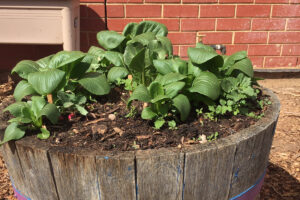Special Programs
CANTEEN
Orders can be made before 9 am on the day of the lunch order via the QKR app on your phone or computer.
Orders can also be made with cash at the front office, or in the student’s classroom.
UNIFORMS
Broad-brimmed hats are required to be worn in Term 1 and Term 4.
Orders for school uniforms can be made through the Spartan School World Website, please see the below attachment.
Breakfast Club
Breakfast Club operates each Wednesday morning from 8:15am to 8:45am and is located in the school hall.
About 50+ students attend each week, and our School Community believes it has been very successful in providing a healthy breakfast for students who for a variety of reasons, do not access this at home.
We implement DfE Healthy Eating Guidelines in available food choices.
We acknowledge the support of local churches, families, volunteers and businesses in the local area.
Our students, parents and teachers enjoy the community aspect and friendship with our volunteers, at our Breakfast Club mornings.
WETLANDS PROGRAMS
Students research during 2008 led them to consider the plight of the Southern Purple Spotted Gudgeon, an endangered native fish. They identified a need for clean, easily monitored natural environments to house these fish.
Students suggested that Warradale develop a Wetlands environment to answer this need. Some under-utilized school land was identified and there was sufficient storm water from roof run off to develop this environment in partnership with Warradale Urban Camp School, Natural Resource Management Board (NRMB), Trees for Life, Bunnings, Bendigo Bank and Marion Council.
In November 2009 the wetlands was planted with the help of our Trees for Life grower, NRMB, students, parents and local business partners. Within weeks we noticed an increase in birdlife in and around the wetlands and over the summer holidays the local provenance plants grew quickly. Some macro invertebrates have been introduced to the water and we are working with the NRMB to develop water quality for the introduction of native fish, including the Southern Purple Spotted Gudgeon. These fish were introduced to the ponds in 2010 and have multiplied. The aim is to grow a sufficient stock of fish to be re-released back into the Murray River System.
During 2010, teachers worked to develop learning units based in the wetlands and a student team maintained the area.
A series of activity sheets have been developed by the teachers for class use as part of the Science program. The Wetlands is also available to visiting schools and community groups by negotiation.
ENVIRONMENTAL PROGRAMS
Project 1:- Ink Cartridges. These are collected on behalf of ‘Close the Loop” (Melbourne based community group) who ensure that the cartridges are broken down and recycled.
Project 2:- Bottle and Cans. The school recycles all plastic drink bottles cans and milk and juice cartons that display the coin refundable logo. The money received is used by the school to purchase sports equipment.
Project 3:- Vegetable Garden: – The school has eight vegetable garden plots for growing vegetables and herbs. Each class provides compost from lunch scraps for the gardens. The excess produce is given away to community members.
Project 4:-Energy conservation:-The school has installed water saving devices on all wash basins, drinking fountains and toilet facilities. Solar panels have been installed on two buildings and records of electricity consumption can be monitored by the students through the curriculum (e.g. Maths, Science). The school is also participates in community forums relating to environmental issues both locally and state wide. Student representatives have attended youth forums and conferences organised by the Natural Resource Management Education department of the state government.
Project 5:- Kerbside Recycling: – The school is involved with the local council’s recycling program where paper, cardboard, plastic bottles, newspapers, and hard plastics are collected on a fortnightly basis.
NATIVE FOOD TRAIL
Native Food Trail
The school has recently been given a grant to construct a Native Foods Trail and Orchard.
The students will be involved in planting a variety of native fruits and herbs and has connections with the local Aboriginal community of our area.
The Native Food Trail will be located adjacent to the Wetlands so that students from our school and visiting schools can study both the habitat of the wetlands and links with the native flora of our district.
VEGETABLE GARDEN
Vegetable Garden at Warradale Primary School
Vegetable Garden: – The school has eight vegetable garden plots for growing vegetables and herbs. Each class provides compost from lunch scraps for the gardens. The excess produce is given away to community members.
SPECIALISTS MUSIC
Selection to the program is through an audition process.
Taught by Education Department Music Teachers, this program expects that children will continue this tuition through to Year 6.
Lessons are conducted during school time and the students are withdrawn from their general lessons. It is expected that the students will catch up on their general lessons in their own time.
The costs for this tuition are minimal and cover instrument hire and music books. Instrument hire fees are paid in advance.
In their final year at the school, Year 6 students can audition for entry into the Brighton High School-Special Music School. Children who play with the School Orchestra can audition to be a member of the Combined Primary Schools String Orchestra that performs nightly with the choirs at the South Australian Children’s Festival of Music.
CHILDREN'S UNIVERSITY
Children’s University Australasia (CUA) is an innovative program that engages children and young people in beyond school learning, increases educational attainment and achievement, and encourages and rewards participants for taking responsibility for their own learning.
Originating in the United Kingdom, CUA works with community and cultural institutions, supports the development of school based clubs and activities, and provides many opportunities to engage parents and communities particularly in the education of young people.
Children can become involved between the ages of 5 and 14 years through clubs and activities.














